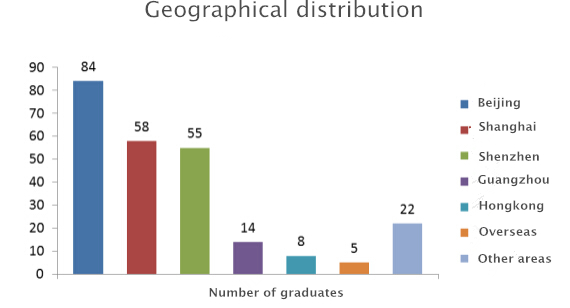Every fall, students from China’s key universities (a quarter of whom graduated from Peking University and Tsinghua University) flood into Shenzhen, the nation’s most vibrant southern metropolis, to start their three-year graduate education at Peking University HSBC Business School (PHBS).
Where did those top students go after graduation? According to a PHBS employment report, 246 students graduated from PHBS in 2015 with master degrees with a focus ranging from finance, quantitative finance, enterprise management, and western economics. Many graduates are now pursuing careers in the financial sector or devoting themselves to academic research. It shows that about 96% of graduates choose to enter the job market, including 83.5% in the financial sector and 16.5% in other sectors; 2.5% graduates choose to pursue doctoral education in the U.S., Europe and Hong Kong.
Overall, most employed former students are working in banking sector and securities, including companies like Goldman Sachs, Citigroup, Credit Suisse, CICC, etc. In addition, 9.3% of them have found employment in government and state-owned institutions, like the People’s Bank of China, the National Development and Reform Commission and China Banking Regulatory Commission; and 16.5% have started their careers at leading companies in the non-financial sectors, such as management consulting, IT and real estate (Tencent, China Vanke).
One hundred and forty six graduates are women, accounting for 60% of the total. Yet, women have long encountered prejudice in the job market, having to fight attitudes that they are less competitive and less competent than their male counterparts. However, PHBS Assistant Professor David Ong thinks such a biased opinion should be revised. Several months ago, he and Chen Zhuoqiong published a research paper in
Economics Letters, showing that female students more crave success than male students.

Beijing, Shanghai and Shenzhen still remain the most desirable metropolises for young talent, attracting 86% new graduates. Other cities like Chengdu and Xi’an are also attractive. What’s the unique charm of Beijing, Shanghai and Shenzhen? A research paper published in
Strategic Management Journal seeks to find the answer by tracking the career development paths of 548 hedge fund managers. Researchers found that the annual returns on funds set up by top managers with work experience in global financial centers (such as New York and London) are 1.5% higher than that of other funds. Knowledge and information can be effectively and rapidly passed to new graduates in those cities.
As the influence of PHBS is on the rise, large multinational companies, such as Goldman Sachs, HSBC, and Morgan Stanly, give high preference to PHBS graduates. It is known that PHBS has international faculty, modern facilities and a state-of-art financial lab, all of which can support students’ education and help them to acquire professional skills. According to Dean Hai Wen, the cultivation of students’ skill, wisdom, fitness, and moral integrity is the mission and foundation of a world-class business school. “PHBS will continue to work on these four important aspects in order to cultivate well-rounded business leaders and societal leaders,” commented Hai.
Therefore, PHBS graduates will not only be able to land good jobs, but also embrace more possibilities. For instance, Zhang Mengxia, class of 2015, has become a PhD candidate at the Marshall School of Business, University of Southern California. Liu Ti has worked in financial sector in Germany after her exchange program at Humboldt University. Graduating with a dual-master’s degree in finance at PHBS and Hong Kong University, Liu Yueming has joined HSBC's Hong Kong investment bank to start her career in the financial sector.
By Annie Jin
Edited by Priscilla Young















